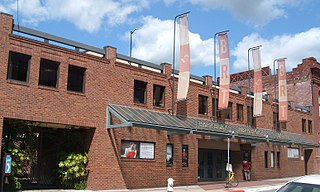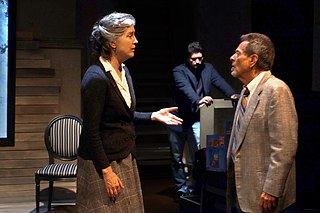Related Research Articles
QED may refer to:

Richard Phillips Feynman was an American theoretical physicist, known for his work in the path integral formulation of quantum mechanics, the theory of quantum electrodynamics, the physics of the superfluidity of supercooled liquid helium, as well as his work in particle physics for which he proposed the parton model. For contributions to the development of quantum electrodynamics, Feynman received the Nobel Prize in Physics in 1965 jointly with Julian Schwinger and Shin'ichirō Tomonaga.
David Louis Goodstein is an American physicist and educator. From 1988 to 2007 he served as Vice-provost of the California Institute of Technology (Caltech), where he is also a professor of physics and applied physics, as well as the Frank J. Gilloon Distinguished Teaching and Service Professor.

QED: The Strange Theory of Light and Matter is an adaptation for the general reader of four lectures on quantum electrodynamics (QED) published in 1985 by American physicist and Nobel laureate Richard Feynman.
Peter Parnell is an American Broadway and Off-Broadway playwright, television writer, and children's book author. Parnell is also Vice-President of the Dramatists Guild of America, the professional association of playwrights, composers, lyricists, and librettists.

Berkeley Repertory Theatre is a regional theater company located in Berkeley, California. It runs seven productions each season from its two stages in Downtown Berkeley.

The Mark Taper Forum is a 739-seat thrust stage at the Los Angeles Music Center designed by Welton Becket and Associates on the Bunker Hill section of Downtown Los Angeles. Named for real estate developer Mark Taper, the Forum, the neighboring Ahmanson Theatre and the Kirk Douglas Theatre are all operated by the Center Theatre Group.
Allison Smith is an American actress, singer, writer and director, best known for her work on television as Mallory O'Brien in Aaron Sorkin's Emmy Award-winning NBC drama The West Wing and for starring on Broadway in the title role Annie. She also played the role of Jennie Lowell on the 1980s Emmy Award winning sitcom Kate & Allie. In addition to starring in Annie, Smith has also appeared on stage in a host of other roles, including a part in the original Broadway production of Evita, a starring role in the Los Angeles premiere production of David Mamet's Oleanna, and supporting roles in Peter Parnell's QED, and the musical The Education Of Randy Newman, in which she played Randy Newman's first wife.

Michael Cristofer is an American actor, playwright and filmmaker. He received the Pulitzer Prize for Drama and the Tony Award for Best Play for The Shadow Box in 1977. From 2015 to 2019, he played the role of Phillip Price in the USA Network television series Mr. Robot.
The Shadow Box is a play written by actor Michael Cristofer. The play made its Broadway debut on March 31, 1977. It is the winner of the 1977 Pulitzer Prize for Drama and Tony Award for Best Play. The play was made into a telefilm, directed by Paul Newman in 1980.
Steven C. Frautschi is an American theoretical physicist, currently professor of physics emeritus at the California Institute of Technology (Caltech). He is known principally for his contributions to the bootstrap theory of the strong interactions and for his contribution to the resolution of the infrared divergence problem in quantum electrodynamics (QED). He was named a Fellow of the American Physical Society in 2015 for "contributions to the introduction of Regge poles into particle physics, elucidation of the role of infrared photons in high energy scattering, and for seminal contributions to undergraduate physics education".
Gordon Davidson was an American stage and film director and the founding artistic director of Center Theatre Group in Los Angeles.

Alan Alda is an American actor, filmmaker and comedian. A six-time Emmy Award and Golden Globe Award winner, he played Hawkeye Pierce in the war television series M*A*S*H (1972–1983). He is known for recurring roles on television series, such as The West Wing and 30 Rock. He received critical acclaim for his appearances in films such as Same Time, Next Year (1978) alongside Ellen Burstyn and for his directorial debut film The Four Seasons (1981). Other appearances include Crimes and Misdemeanors (1989), Flirting with Disaster (1996), the Cold War drama film Bridge of Spies (2015), and Marriage Story (2019). In 2004, Alda was nominated for the Academy Award for Best Supporting Actor for his role in The Aviator. He is also known as Uncle Pete in the Peabody Award–winning tragicomedy web series Horace and Pete. Alda has also received three Tony Award nominations for his Broadway performances in The Apple Tree (1967), Jake's Women (1992), and Glengarry Glen Ross (2005). In 2019, Alda received the Screen Actors Guild Life Achievement Award.

Les Waters is a British theatre director. Waters was the Artistic Director of the Actors Theatre of Louisville. He has directed plays Off-Broadway and also at Berkeley Repertory Theatre and Actors Theatre.

The Feynman Lectures on Physics is a physics textbook based on some lectures by Richard Feynman, a Nobel laureate who has sometimes been called "The Great Explainer". The lectures were presented before undergraduate students at the California Institute of Technology (Caltech), during 1961–1963. The book's co-authors are Feynman, Robert B. Leighton, and Matthew Sands.

The Meaning of It All: Thoughts of a Citizen Scientist is a non-fiction book by the Nobel Prize-winning physicist Richard Feynman. It is a collection of three previously unpublished public lectures given by Feynman in 1963. The book was first published in hardcover in 1998, ten years after Feynman's death, by Addison–Wesley. Several paperback and audiobook editions of the book have subsequently been published.

Tribes is a play by English playwright Nina Raine that had its world premiere in 2010 at London's Royal Court Theatre and its North American premiere Off-Broadway at the Barrow Street Theatre in 2012. The play won the 2012 Drama Desk Award for Outstanding Play.
Pam MacKinnon is an American theatre director. She has directed for the stage Off-Broadway, on Broadway and in regional theatre. She won the Obie Award for Directing and received a Tony Award nomination, Best Director, for her work on Clybourne Park. In 2013 she received the Tony Award for Best Direction of a Play for a revival of Who's Afraid of Virginia Woolf? She was named Artistic Director of American Conservatory Theater in San Francisco, California on January 23, 2018.

Indra's Net Theater is a not-for-profit theatre company located in Berkeley, California that focuses on plays about science and the deeper questions of life and existence. The company produces new and classic plays, staged readings and special events at various locations in and around Berkeley, CA. They are known for their unique stagings, often including live and/or original music, dance, and visual art.
References
- 1 2 Goodstein 2001
- ↑ Ch. 12 in Alda 2007
- ↑ A review is Goodstein 2001
- ↑ IBDB entry
- ↑ Event description. World Science Festival. Retrieved 2008-06-11. [ dead link ]
- ↑ ETOPiA: The Engineering Transdisciplinary Outreach Project in the Arts: Robert R. McCormick School of Engineering and Applied Science: Northwestern University
- ↑ Press release for 2004 production at "Roes" theater.
- ↑ Review for the 2005 production at "Anesis" theater.
- ↑ Review for the 2005 production at "Anesis" theater.
- ↑ Review for the 2005 production at "Anesis" theater.
- ↑ Presentation of the show at the "Tholos" site.
- ↑ Announcement of the tour.
- ↑ Announcement of the tour. [ permanent dead link ]
- ↑ Event description
- ↑ Festival della Scienza programme entry, archived from the original on June 3, 2006, retrieved 2012-08-01
- ↑ "THEATER REVIEW: An Amazing Performance in INDra's NET "QED" at Berkeley City Club. Category: Arts & Events from the Berkeley Daily Planet".
- ↑ "QED by Peter Parnell | 2014/15 Season | Lantern Theater Company".